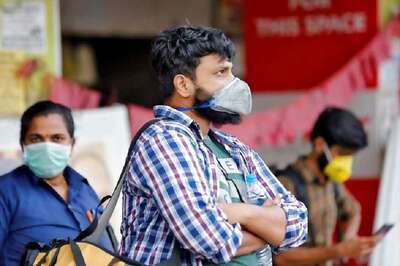
views
Starting Sunday, Hong Kong residents can apply for a special visa which offers them the opportunity to become British citizens. The move by UK has come as a response to Beijing’s imposition of a national security law in the Asian financial hub last year.
But China is not happy. The two nations have been, for some time, exchanging barbs over pro-democracy protests in Hong Kong in 2019, and 2020. London says Beijing is trying to silence dissent in Hong Kong.
The new visa move comes amid China and Hong Kong’s declaration that they will no longer recognise the British National Overseas (BNO) passport as a valid travel document from Sunday, Jan. 31.
As speculation remains rife over what will happen next, here’s a lowdown on how the dispute took shape over the years:
Historical Arrangement(s)
In 1984, British Prime Minister Margaret Thatcher and Chinese Prime Minister Zhao Ziyang signed an agreement in the Beijing’s Hall of the People to promise Britain to return Hong Kong to China in 1997, in exchange for terms promising a 50-year extension of its capitalist regime.
But wait, the actual arrangements start way back. Let’s rewind further.
The United Kingdom actually obtained control over portions of Hong Kong’s territory through three treaties concluded with Qing China after the Opium Wars in the 19th century.
Britain invaded China in 1839 during the First Opium War. One of its first acts of war was to occupy Hong Kong. China ceded the island to the British In 1841. At the end of the Second Opium War in 1860, China was forced to cede the Kowloon Peninsula, adjacent to Hong Kong Island, along with other islands.
As an East-West trade hub and as the commercial gateway and distribution centre for southern China, Britain’s new colony flourished. And in 1898, Britain was granted an additional 99 years of rule over the Hong Kong colony. Even though the Japanese occupied Hong Kong from 1941 to 1944 during the World War II, it was in British hands throughout many of China’s political upheavals in the 20th century.
Coming back to where we started in the Beijing’s Hall of the People in 1984, it was the start of the ‘one country, two systems’ – the principle is enshrined in a document called the Basic Law, which is Hong Kong’s mini constitution.
It protects rights such as freedom of assembly and freedom of speech, neither of which exist in mainland China, and sets out the structure of governance.
An Extradition Law, and a Threat to Old Liberties
Hong Kong residents in 2019 began protesting Beijing plans to allow extradition to mainland China. There was fear among critics that the move would undermine judicial independence, as under the ‘one country, two system’ ensured its people had more autonomy and rights than the rest of China.
In April, the extradition bill – The Fugitive Offenders and Mutual Legal Assistance in Criminal Matters Legislation (Amendment) Bill 2019 – that provoked the first outcry was presented. It would have allowed, under some cases, criminal suspects to be extradited to mainland China.
Critics said this risked exposing Hong Kongers to abusive treatment and unfair trials. The bill would give China greater control over Hong Kong and could be used to harass activists and journalists, they also argued.
Thousands thronged streets in protest of the bill. After weeks, Chief Executive of Hong Kong Carrie Lam said the bill would be suspended indefinitely. The bill was finally withdrawn in September, but by then, Hong Kong had seen too much turmoil and unrest over the issue.
On October 1, 2019, the city saw violent clashes, while China celebrated 70 years of Communist Party rule.
As protestors fought police with poles, gas bombs and other projectiles, an 18-year-old was shot in the chest with a live bullet. Protesters wearing face masks were then barred by the government. A pro-Beijing lawmaker was stabbed in the street in early November by a man pretending to be a supporter.
How Did the Proposal Come About?
It came about after an alleged murder case. A 19-year-old Hong Kong man allegedly murdered his pregnant girlfriend while holidaying in Taiwan together in February 2018. The man fled Taiwan and returned to Hong Kong, and when Taiwan officials wanted to extradite the man, Hong Kong said it could not comply because of its extradition agreement with Taiwan.
While the Taiwanese government said it would not attempt to extradite the alleged murder under the new amendments, the extradition proposal set fire to alarm, especially for activists, human rights lawyers, journalists, and social workers working under Beijing’s eye.
A Hong Kong bookseller Lam Wing Kee said he was abducted, detained and charged with operating a bookstore illegally in China in 2015 for selling books that were critical of Chinese leaders.
After Protests, a Law to ‘Secure’ Hong Kong
In June 2020, Beijing unveiled details of a controversial national security law, which took into effect just before midnight on the eve of the anniversary of its handover from British to Chinese rule on July 1.
The international human rights organisation Amnesty has said that immediately after the law’s passage, “authorities started to use it to crack down on legitimate and peaceful expression.”
“People were arrested for possessing flags, stickers and banners with political slogans. Police and officials have also claimed that slogans, T-shirts, songs and pieces of white paper could endanger national security and lead to criminal prosecution. Two days after the law was passed, the Hong Kong government declared that “Liberate Hong Kong, the revolution of our times”, a common political slogan during last year’s protests, “connotes ‘Hong Kong independence”, or separating Hong Kong from China, and effectively forbade its use,” said Amnesty.
“It is clear that the law will have a severe impact on freedom of expression, if not personal security, on the people of Hong Kong,” Professor Johannes Chan, a legal scholar at the University of Hong Kong, told the BBC before the passage of the law.
On July 1 itself, police arrested more than 300 people as protesters took to the streets. Ten were arrested under the new national security law.
That’s where Britain stepped in and promised to grant those in Hong Kong with British National Overseas (BNO) passports five years of limited stay to work or study as a pathway to citizenship.
The United Nations too said it was “alarmed” at arrests in Hong Kong under new law.
These were some of the controversial things carried out under the law, even as international pressure mounted:
⚫ Hong Kong’s Education Bureau urged schools to review textbooks to make sure they do not violate security law.
⚫ First person charged under the new law is denied bail.
⚫ New national security office employing mainland agents was set up in a Hong Kong hotel. Protest anthem “Glory to Hong Kong” was banned in schools.
⚫ On July 14, Beijing’s top representative office in Hong Kong warned that primary elections to select democracy candidates for Legislative Council elections in September could violate the national security law.
⚫ The University of Hong Kong (HKU) sacked veteran pro-democracy activist Benny Tai on July 28 from his tenured position as an associate professor of law.
⚫ On July 30, Hong Kong disqualified a dozen pro-democracy candidates from running in the September election, citing reasons including collusion with foreign forces and opposition to the new law.
⚫ A day later, Carrie Lam postponed the September election, citing a spike in coronavirus cases.
Britain Steps in
On July 20, Britain announced it would suspend its extradition treaty with Hong Kong. The UK government has often reiterated that new law restricts the rights and freedoms of the people of Hong Kong and “constitutes a clear and serious breach of the Sino-British Joint Declaration”.
Cut to Now
Britain says it is fulfilling a historic and moral commitment to the people of Hong Kong after Beijing imposed the security law on the semi-autonomous city that Britain says breaches the terms of agreements under which the colony was handed back to China in 1997.
The UK government forecasts the new visa could attract more than 300,000 people and their dependents to Britain. Beijing said it would make them second-class citizens.
The scheme, which was first announced last year, allows those with BNO status to live, study and work in Britain for five years and eventually apply for citizenship. But China maintains the West’s views on its actions over Hong Kong are clouded by misinformation and an imperial handover.
(With inputs from agencies)
Read all the Latest News, Breaking News and Coronavirus News here



















Comments
0 comment